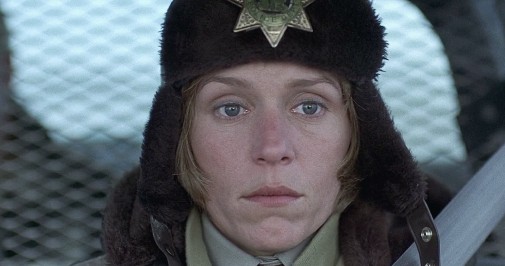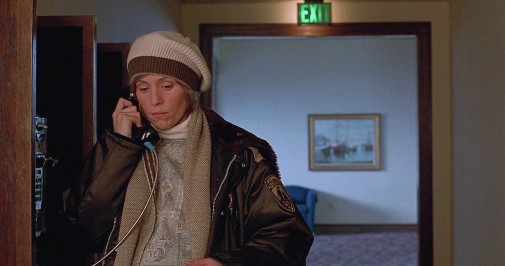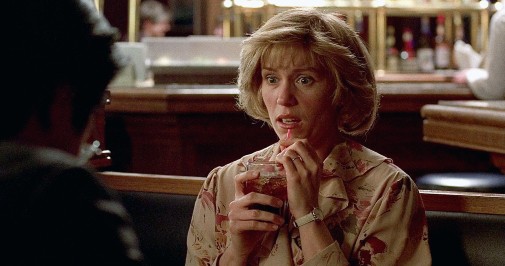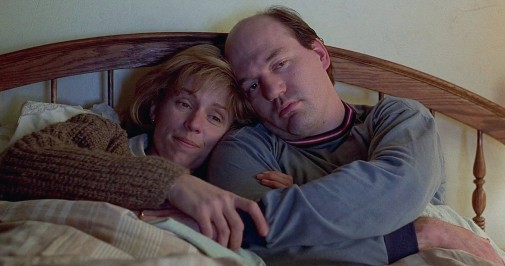
With Frances McDormand back in the Oscar conversation thanks to Chloe Zhao's Nomadland, I'm reminded of some discussions I had when Three Billboards Outside Ebbing Missouri was making its way through the festival circuit. On first viewing, I was more charmed by the movie than many of my friends and colleagues (subsequent re-watches killed that initial goodwill), finding myself defending some of the picture's elements to its impassioned detractors. Three years later, there's still a critique of Frances McDormand's second Oscar-winning performance that infuriates me, even though I'm no big fan of her turn as Mildred Hayes.
According to people whose opinions I respect, McDormand was doing the same thing she always does. More alarmingly, I was told that the actress was just repeating her first Oscar-winning performance in Fargo. Whatever one may think about this thespian's pair of Academy Award-winning works, they are different, diametrically opposed even. In many ways, Mildred is the antithesis of Marge Gunderson…

Frances McDormand takes a while to enter the narrative of Fargo, but when she does, one can't help but be shocked and charmed by her demeanor. The cosmos where the Coen brothers set their stories is one ruled by nihilism, sarcasm, and a withering lack of sincerity. To be kind in such a world is often equal to being weak or the naïve laughing stock of some other cruel character. With her pregnant belly and cheery disposition, Marge is the exception that proves the rule, standing out among the Coen's collection of protagonists as a ray of sunshine banishing the darkness.
Through the filmmakers' conception of Marge, we find out that such a kind spirit doesn't exist apart from the evils of the world. As a police officer investigating ghoulish murders, she's a shrewd observer who's accustomed to seeing human degradation. However, McDormand never erases her character's essential goodness, not even when illustrating the toll that violence has had on her soul. It may be funny to watch this woman wobble through a crime scene firing witty dialogue with a thick Minnesotan accent, but we're always aware of both her intelligence and integrity.

Playing luminously good people for the camera is a big challenge, with the actor always tempted to comment upon their character. Whether equating kindness to dimness or joy to infantile innocence, it's easy to fall on psychologically flat reductivism, betraying one's role while trying to make them more interesting to the viewer. McDormand never does this. Instead, she elevates Marge from the realm of caricature to an upper echelon of believable humanity. This woman doesn't live above the nihilism of the Coen cosmos, she is drowning in it, shaped by it, and chooses to resist it. Marge's kindness is natural but she's not without steel or revulsion, without awareness or doubt.
Watching her interview reluctant witnesses is hilarious, though believable, while her dealings with a friend from the past are excruciating in their sharp awkwardness. Marge is always in control during these scenes and McDormand is in control too, differentiating genuine cheer from polite social warfare, delineating how her character fights to not succumb to the horror of her surroundings. Throughout her investigation, the policewoman has seen evils she didn't know before these events, she's horrified, but she must move on. Her last few scenes, starting with a grisly discovery and an armed confrontation, thus play like a severe morality tale.

In these moments, McDormand plays Marge as unbelievably tired. She's also stern, like a stone monument facing a mighty storm and refusing to be made into rubble. It's quietly beautiful, one of the best depictions of psychological resilience in modern cinema and the best acting this Triple Crown winner has ever delivered. How is this, in any way, shape, or form, similar to the vitriolic sharpness of Three Billboards? Marge is defined by her choice of kindness over the pull of suffering. She's played lightly, with interior details woven on the margins of scenes. Mildred is a blunter exercise, someone who looked evil in the eye and succumbed to the siren call of despondence, turning embittered and cruel.
As a performer, Frances McDormand has her ticks and tricks, her repertoire of expression and vocal plasticity, but to say she's constantly repeating herself seems to miss the point of her work and the reality of her characters. While I haven't yet seen Nomadland, I eagerly await seeing what new shapes McDormand has twisted her screen persona into. Superficially, she might not seem like the most versatile of modern actresses, but few can compare to her control of tone or the malleability with which she adapts to her films' specificities. She's never just repeating what she did in Fargo!

Fargo is now available to stream on Netflix and Amazon Prime.